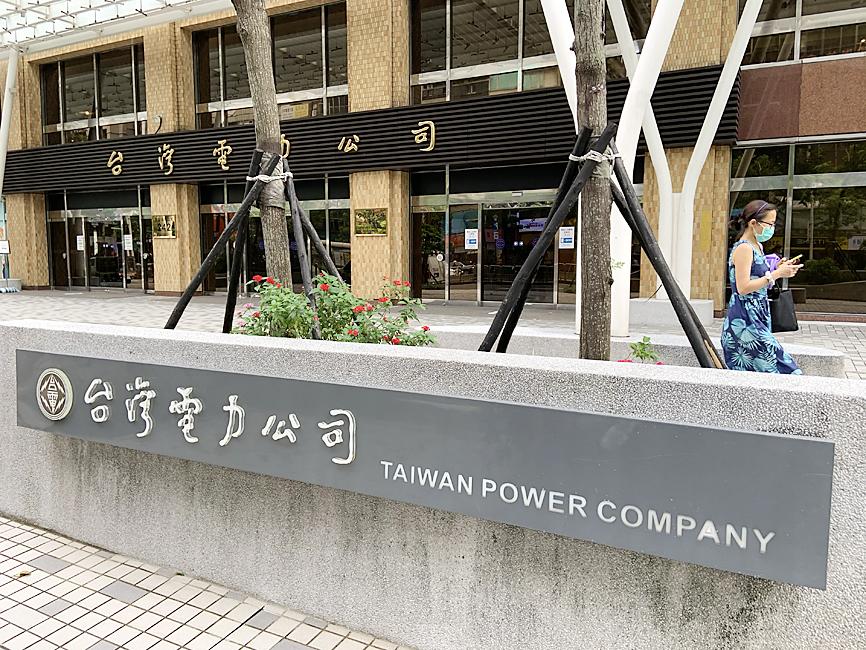Taiwan Power Co (Taipower, 台電) on Thursday reported a pretax loss of NT$67.2 billion (US$2.26 billion) for the first five months of the year, widening from a pretax loss of NT$46.9 billion in the first four months and compared with a pretax profit of NT$14.1 billion for the same period last year.
The state-run utility’s aggregate losses climbed to NT$105.7 billion as of the end of May, compared with accumulated losses of NT$38.4 billion as of May 31 last year, the company said on its Web site, citing soaring international energy prices.
The implementation of summer electricity rates, which took effect on June 1 and are to run until Sept. 30, is expected to make a slight contribution to the company’s bottom line for last month.

Photo: Tu Chien-jung, Taipei Times
Moreover, electricity rate increases of 8.4 percent on average, which took effect on Friday, would further help Taipower ease its financial pressure.
Taipower is expected to pay an extra NT$300 billion for fuel imports this year, the Ministry of Economic Affairs said on Monday last week, as it announced the new electricity rates, including a 15 percent increase for large industrial users, such as 22,000 firms that consume high-voltage or ultra-high-voltage electricity.
However, about 97 percent of users, including households, small businesses and several service sectors, would be spared the increases in view of inflationary pressure, the ministry said.
Taipower’s cost of power generation this year increased significantly compared with last year, as Russia in February started an invasion of Ukraine and the COVID-19 pandemic continued to disrupt supply chains, boosting international coal and natural gas prices, acting chairman Tseng Wen-sheng (曾文生) said.
Asked whether Taipower’s pretax losses would this year exceed NT$100 billion, Tseng was quoted by the Chinese-language Commercial Times as saying on June 25 that it would depend on two factors: the increased electricity rates and the development of international fuel prices in the second half of the year.
SEE AEC ON PAGE 3

NEW IDENTITY: Known for its software, India has expanded into hardware, with its semiconductor industry growing from US$38bn in 2023 to US$45bn to US$50bn India on Saturday inaugurated its first semiconductor assembly and test facility, a milestone in the government’s push to reduce dependence on foreign chipmakers and stake a claim in a sector dominated by China. Indian Prime Minister Narendra Modi opened US firm Micron Technology Inc’s semiconductor assembly, test and packaging unit in his home state of Gujarat, hailing the “dawn of a new era” for India’s technology ambitions. “When young Indians look back in the future, they will see this decade as the turning point in our tech future,” Modi told the event, which was broadcast on his YouTube channel. The plant would convert

‘SEISMIC SHIFT’: The researcher forecast there would be about 1.1 billion mobile shipments this year, down from 1.26 billion the prior year and erasing years of gains The global smartphone market is expected to contract 12.9 percent this year due to the unprecedented memorychip shortage, marking “a crisis like no other,” researcher International Data Corp (IDC) said. The new forecast, a dramatic revision down from earlier estimates, gives the latest accounting of the ongoing memory crunch that is affecting every corner of the electronics industry. The demand for advanced memory to power artificial intelligence (AI) tasks has drained global supply until well into next year and jeopardizes the business model of many smartphone makers. IDC forecast about 1.1 billion mobile shipments this year, down from 1.26 billion the prior

People stand in a Pokemon store in Tokyo on Thursday. One of the world highest-grossing franchises is celebrated its 30th anniversary yesterday.

Zimbabwe’s ban on raw lithium exports is forcing Chinese miners to rethink their strategy, speeding up plans to process the metal locally instead of shipping it to China’s vast rechargeable battery industry. The country is Africa’s largest lithium producer and has one of the world’s largest reserves, according to the US Geological Survey (USGS). Zimbabwe already banned the export of lithium ore in 2022 and last year announced it would halt exports of lithium concentrates from January next year. However, on Wednesday it imposed the ban with immediate effect, leaving unclear what the lithium mining sector would do in the